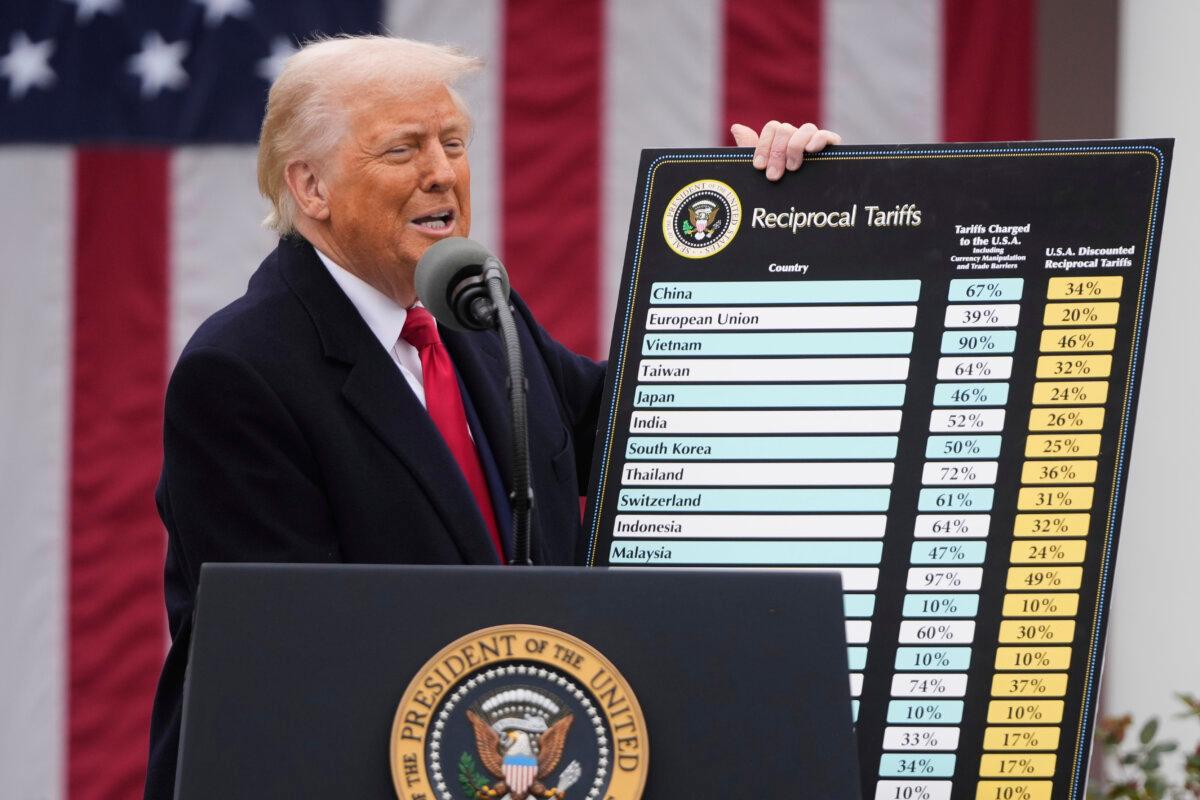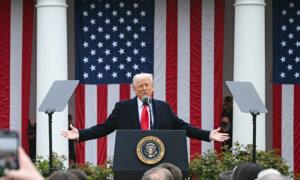Washington’s new measures could derail China’s economic growth, according to Zhiwu Chen, a finance professor at HKU Business School.
Markets around the world tumbled on April 3 in response to U.S. President Donald Trump’s global reciprocal tariffs.
The STOXX 600, which covers 600 companies across 17 European countries—where the EU faces 20 percent tariffs—fell 1.5 percent by 7:53 a.m. GMT on Thursday. In Britain—which faces tariffs of 10 percent—the FTSE 100 shed 1.2 percent.
Other stock markets which had opened earlier were hit with similar declines, following Trump’s tariff announcement on Wednesday afternoon.
U.S. futures tracking the S&P 500 fell 3.33 percent by 12:08 GMT, Dow futures dropped 2.73 percent, and Nasdaq 100 e-minis plunged 3.83 percent.
Oil prices sunk by almost three percent.
Trump unveiled his long-promised plan to rebalance global trade through reciprocal U.S. tariffs on Wednesday. He imposed a minimum 10 percent tariff on most goods imported into the United States, with a higher 20 percent rate applied to imports from the European Union. Washington claimed the EU’s effective tariff rate on U.S. goods was 39 percent.
Emmanuel Makonga, Vice President of European Equity Strategy at Barclays Investment Bank, said the tariffs have “tilted the mood towards recession expectations, which was not necessarily the case prior to that.”
“It opens the probability for [the European Central Bank] to cut interest rates even faster in order to provide a little bit of boost with regard to sentiment,” he said.
“China, 67 percent—that’s tariffs charged to the USA, including currency manipulation and trade barriers,” he said. “So 67 percent, [we’re] charging a discounted reciprocal tariff of 34 percent” to China.
Kaiyuan Securities said it expects the new tariffs could slash Chinese exports to the United States by 30 percent and cut overall exports by more than 4.5 percent.
“It’s an all-round blockade against China,” said Yuan Yuwei, hedge fund manager at Water Wisdom Asset Management.
Zhiwu Chen, a finance professor at HKU Business School, said Washington’s new measures could derail China’s economic growth and its efforts to fight deflation.
“This will make it impossible for the 5 percent growth target to be achieved,” Chen said. “China cannot get out of this deflationary situation anytime soon. This new tariff increase is definitely making things worse.”

President Donald Trump speaks during an event to announce new tariffs in the Rose Garden at the White House on April 2, 2025. Mark Schiefelbein/AP Photo
Japan’s Nikkei share average slumped to an eight-month low after it was hit with a 24 percent levy.
Japan’s most famous stock market index, dropped as much as 4.6 percent in early trading, its lowest point since Aug. 7, but by the close, the losses had moderated, with the index finishing down 2.8 percent.
Financial experts said that the tariffs were larger than anticipated.
Albanese ruled out reciprocal tariffs.
“The (Trump) administration’s tariffs have no basis in logic and they go against the basis of our two nations’ partnership. This is not the act of a friend,” Albanese told reporters on Thursday. “We will not join a race to the bottom that leads to higher prices and slower growth.”
Carney: ‘We are going to fight’
Speaking in the Uzbek city of Samarkand on Thursday, ahead of an EU–Central Asia partnership summit, European Commission President Ursula von der Leyen said the EU is preparing further countermeasures to protect its interests and businesses if negotiations fail.
Trump is not imposing his new 10 percent global rate on top trading partners Canada and Mexico, but his previous order remains in place for up to 25 percent tariffs.
Canadian Prime Minister Mark Carney said, “We are going to fight these tariffs with counter-measures, we are going to protect our workers, and we are going to build the strongest economy in the G7.”
Mexico’s President Claudia Sheinbaum said on Wednesday that Mexico would not pursue a “tit-for-tat on tariffs” but will announce a “comprehensive program” on Thursday.
The government of Latin America’s largest economy, Brazil, which has a 10 percent tariff, said it was “evaluating all possible actions to ensure reciprocity in bilateral trade, including resorting to the World Trade Organization.”
Crystal-Rose Jones, Reuters, and The Associated Press contributed to this report.
Original News Source Link – Epoch Times
Running For Office? Conservative Campaign Consulting – Election Day Strategies!


